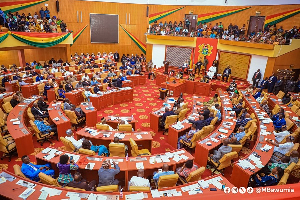In Ghana’s early history, dead bodies were often consecrated, which people dreaded seeing in light of our ancestors’ beliefs about health and spirituality. A traditional belief holds that seeing or coming into contact with dead bodies portends a bad omen and necessitates ritual cleansing procedures like taking a spiritual bath.
Additionally, our community’s chiefs, opinion leaders, and elders used myths, community by-laws, folktales, and norms to discourage people, particularly children, from attending funeral services held in the community.
These practices were deeply rooted in the cultural fabric of our community and served as a way to protect individuals from potential harm or negative energy associated with death. The spiritual bath, for example, was believed to purify one’s soul and ward off any lingering spirits or curses that may have been present at the funeral.
By incorporating these cultural practices, communities were able to create a sense of unity and share responsibility for maintaining public health. This approach not only protected individuals from potential diseases but also fostered a collective understanding of the importance of hygiene and sanitation in preventing the spread of illnesses.
According to the Public Health Laboratory Service (UK), tuberculosis, hepatitis B and C, HIV/AIDS, and Group, streptococcal diseases pose the greatest risk for people handling or coming into contact with dead bodies. These findings highlight the critical need for proper training and protective measures when dealing with deceased individuals. By implementing strict protocols and providing appropriate personal protective equipment, the risk of transmission can be significantly reduced, ensuring the safety of those involved in handling dead bodies.
The Ebola outbreak resulted in thousands of deaths and highlighted the need for improved global health response systems. Similarly, the COVID-19 pandemic, caused by the novel coronavirus, has affected millions of people worldwide since its emergence in late 2019, leading to widespread health and economic consequences. 1 Ebola and COVID-19 viruses however can survive in the dead bodies of people who have died and spread to other people when they come into contact with the blood, organs, or bodily fluids of the deceased.
This emphasizes the importance of implementing proper protocols for handling and disposing of deceased individuals to prevent further transmission. Additionally, healthcare workers and funeral personnel should take the necessary precautions to protect themselves and others while dealing with these highly contagious viruses.
Recently, the exposure of dead bodies in Ghana’s public spaces has sharply increased and threatens to jeopardize public health. Since health systems are not allowed to publicly disclose the reason for the deaths of our loved ones, coworkers, or other individuals due to information privacy laws, this makes it incredibly risky to work with dead bodies directly, as it becomes difficult to determine the cause of death. Those who handle dead bodies without the necessary information and comprehension could unknowingly put their health at risk.
A developing country like Ghana would be devastated by any disease outbreak brought on by handling dead bodies. Not only will it result in a significant loss of lives, but it will also have severe economic and social consequences. The already strained healthcare system will be overwhelmed, and the country’s resources will be further depleted in trying to contain and manage the outbreak.
Several factors have contributed to the ominous activity of mockingly exposing dead bodies in public.
One factor is the lack of awareness and understanding of the risks associated with handling dead bodies during a disease outbreak. This lack of awareness can lead to improper handling and disposal practices, increasing the chances of transmission.
Additionally, cultural practices and beliefs may also play a role in the behavior, as some communities may have traditional rituals or customs that involve the public display of deceased individuals.
Once more, using technology improperly and obtaining views on social media are major factors in these sins because they can spread fear among the populace and perpetuate misinformation. It is crucial for authorities and health organizations to actively educate the public about the potential dangers and provide clear guidelines on safe practices when dealing with deceased bodies.
It is important to remember, too, that false information and a lack of understanding can play a big part in encouraging these dangerous practices.
People could unwittingly take part in activities that aid in the spread of diseases like Ebola or COVID-19 if they lack correct knowledge and a grasp of the implications.
Additionally, promoting cultural practices that do not involve physical contact or large gatherings can help mitigate the risks associated with honoring and mourning the dead during times of public health crises. Therefore, implementing effective measures to prevent disease transmission from handling dead bodies is essential for safeguarding the well-being and stability of Ghana. It is crucial to establish clear guidelines and protocols for handling and disposing of dead bodies to ensure the safety of those involved in such tasks.
In conclusion, authorities must address this issue promptly by enforcing strict regulations and guidelines for the handling and disposal of deceased individuals. Public awareness campaigns should also be conducted to educate the public about the importance of proper protocols to prevent further transmission and protect public health.
Additionally, authorities must provide adequate resources and training to healthcare workers and first responders to ensure they are equipped with the necessary knowledge and protective measures. By doing so, they can effectively minimize the risk of transmission and safeguard the well-being of both the public and those on the frontlines. Regular updates and transparent communication from authorities will help instill trust in the community and encourage compliance with these protocols.
Opinions of Thursday, 17 August 2023
Columnist: Joshua Boakye Dankwah















